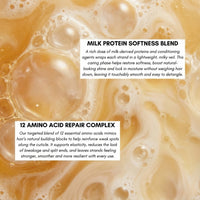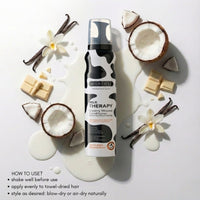How to Find Your Scalp Type: A Step-by-Step Guide
Posted by MORFOSE COSMETICS

How to Find Your Scalp Type: A Step-by-Step Guide
Your scalp health is crucial for healthy hair growth, and it often goes unnoticed. Many people invest in expensive hair products to maintain the health of their locks without paying attention to their scalp type. If you're wondering how to find your scalp type, then you've come to the right place. In this article, we'll discuss the importance of understanding your scalp type as well as a step-by-step guide to help you determine your scalp type.
Understanding the Importance of Scalp Type
Before we delve into how to find your scalp type, it's crucial to understand why it's essential to know it. Your scalp type determines what hair care routine suits you best. Moreover, it's crucial to use hair products that complement your scalp type to maintain the health of your hair. Understanding your scalp type can also help you prevent hair loss, dandruff, and other scalp-related issues.
Did you know that your scalp is an extension of your facial skin? It's true! The scalp has sebaceous glands that produce sebum, an oily substance that moisturizes the scalp and hair. The amount of sebum produced by your scalp determines your scalp type. If your scalp produces too much sebum, it's oily, and if it produces too little, it's dry.
The Connection Between Scalp Type and Hair Health
Your scalp type plays a significant role in maintaining healthy hair. If you have an oily scalp, excess sebum can clog your hair follicles, leading to hair thinning and hair loss. Similarly, a dry scalp can cause dandruff, itchiness, and hair breakage. By understanding your scalp type, you can choose the right hair care products and prevent these issues from occurring.
It's also worth noting that your scalp type can change over time. Hormonal changes, stress, and environmental factors can all affect the amount of sebum produced by your scalp. If you notice changes in your scalp type, it's essential to adjust your hair care routine accordingly.
How Scalp Type Affects Hair Care Routine
Your hair care routine should complement your scalp type. For instance, if you have an oily scalp, you should use a mild shampoo and avoid using heavy conditioners. On the other hand, if you have a dry scalp, you should use a moisturizing shampoo and conditioner. Using the wrong hair care products can make your scalp-related issues worse.
It's also essential to pay attention to the ingredients in your hair care products. Look for products that contain ingredients that are beneficial for your scalp type. For example, tea tree oil is great for oily scalps as it has antibacterial properties that can help prevent dandruff and other scalp-related issues. On the other hand, jojoba oil is excellent for dry scalps as it's a natural moisturizer that can help soothe an itchy scalp.
Finally, it's important to remember that a healthy scalp equals healthy hair. By understanding your scalp type and using the right hair care products, you can maintain the health of your scalp and hair and prevent scalp-related issues.
Identifying the Different Scalp Types
Normal Scalp
If you have hair that is well-nourished, shiny, and voluminous, you likely have a normal scalp. Normal scalp implies that your glands are producing just enough sebum to keep your scalp hydrated without making it too oily or too dry.
However, it is important to note that even with a normal scalp, external factors such as pollution, harsh hair products, and weather changes can still affect your scalp's health. Therefore, it is crucial to take good care of your scalp by using gentle hair products and keeping it clean and moisturized.
Oily Scalp
If you have an oily scalp, your scalp produces excess sebum. This can make your hair look greasy and clumpy even after washing. People with oily scalp must avoid using heavy hair products as they can make the scalp greasier.
In addition to this, people with oily scalp should avoid touching their hair too often as the oils from their hands can transfer to their scalp, making it even more oily. It is also important to wash your hair frequently with a gentle shampoo that helps regulate the production of sebum on your scalp.
Dry Scalp
A dry scalp can make your scalp itchy, flaky, and uncomfortable. Without enough sebum, the scalp can lose moisture and start to peel, causing dandruff. People with dry scalp must use hair products that add moisture to their hair and avoid using hairstyles that cause the scalp to dry out.
In addition to using moisturizing hair products, it is important to avoid using hot tools such as flat irons and blow dryers as they can further dry out your scalp. It is also recommended to use a scalp treatment once a week to keep your scalp hydrated and healthy.
Combination Scalp
Some people have a combination of oily and dry scalp. Their scalp may be dry in some areas and oily in others. People with combination scalp must use hair products that balance the oil production on their scalp, making sure not to dry out the scalp's dry areas.
It is also important to avoid using heavy hair products that can make the oily areas of your scalp even more oily. Using a gentle shampoo that is specifically designed for combination scalp can help regulate the production of sebum on your scalp.
Sensitive Scalp
People with sensitive scalp experience itching, redness, and dryness. They must use hair care products that are mild, fragrance-free, and hypoallergenic.
In addition to using gentle hair products, people with sensitive scalp should avoid using hot water when washing their hair as it can further irritate the scalp. It is also recommended to use a scalp treatment that contains soothing ingredients such as aloe vera and chamomile to calm down the scalp.
Step-by-Step Guide to Determine Your Scalp Type
Having healthy hair starts with understanding your scalp type. Your scalp type determines the amount of oil your scalp produces and the type of hair care products you should use. Here's a step-by-step guide to help you determine your scalp type.
Step 1: Observe Your Hair and Scalp
Take a close look at your hair and scalp. Notice any flakes, redness, itching, and irritation. Check if your hair looks dull and lifeless or if it's voluminous and shiny. These observations can give you a clue about your scalp type.
For example, if you notice flakes on your scalp, you may have a dry scalp. Flakes are a sign that your scalp is not producing enough oil.
Step 2: Perform the Blotting Paper Test
The blotting paper test can help you determine your scalp type. Take a piece of blotting paper and press it on different areas of your scalp. Observe the paper and note any visible oil on it.
If there's visible oil on the paper, you likely have an oily scalp. Oily scalp is a result of overproduction of oil by the sebaceous glands in your scalp. If there's no oil on the paper, then your scalp is dry.
Step 3: Assess Your Scalp's Sensitivity
If you experience redness, itching, and irritation on your scalp, then you have a sensitive scalp. Note down the hair products you use and check their ingredients. Some hair products have harsh chemicals that can damage your scalp and hair.
For instance, if you experience itching after using a particular hair product, it's a sign that the product is not suitable for your scalp type.
Step 4: Analyze Your Hair Care Routine
Check if the hair products you use complement your scalp type. If you have an oily scalp, make sure to use a mild shampoo and avoid using heavy conditioners. Similarly, if you have a dry scalp, use a moisturizing shampoo and conditioner.
It's essential to choose hair care products that suit your scalp type. Using the wrong products can cause damage to your hair and scalp.
Step 5: Consult a Professional if Needed
If you're still unsure about your scalp type, consult a professional. They can perform a scalp analysis and suggest the right hair care products.
A professional can also help you identify any underlying scalp conditions that may require medical attention.
By following these simple steps, you can determine your scalp type and choose the right hair care products that don't cause damage to your hair and scalp. Taking care of your scalp is essential for healthy hair growth and prevents scalp-related issues. So, make sure to know your scalp type and take care of it to maintain voluminous, shiny, and healthy hair.



